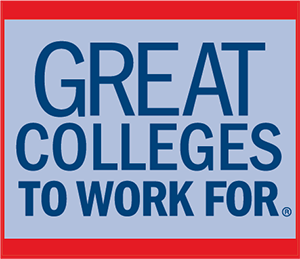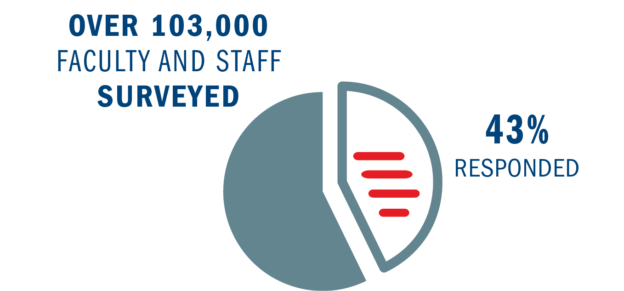The Great Colleges to Work For® program was designed to recognize colleges that have been successful in creating great workplaces and to further research and understand the factors, dynamics and influences that have the most impact on organizational culture in higher education.
This year marked the 16th anniversary of the Great Colleges to Work For program, which included 194 colleges from across the country: 121 four-year colleges and 73 two-year colleges. All accredited institutions in the United States with an enrollment of at least 500 were invited to participate, at no cost to them.
At the core of the program is a two-part assessment process. The first component is a faculty/staff survey (The ModernThink Higher Education Insight Survey©). The survey was sent to over 103,000 faculty and staff, with an overall response rate of 43%. Of the responses received, 6,673 of them were administrators, 13,496 were faculty, 15,251 were exempt staff, 7,852 were non-exempt staff, and 1,160 were adjunct faculty.
The core survey contains 55 statements, plus an additional 5 Faculty Experience statements for faculty and adjunct faculty only. It utilizes a five-point agreement scale (Strongly Agree, Agree, Sometimes Agree/Sometimes Disagree, Disagree, Strongly Disagree), plus a Not Applicable response option. The survey instrument also includes a 20-item benefits satisfaction component, 8 optional demographics, 2 pre-loaded demographics (employees were tagged with these demographic choices), and 2 open-ended questions.
The ModernThink Higher Education Insight Survey measures ten core dimensions, plus a Faculty Experience dimension, reflecting managerial and organizational competencies. These dimensions were determined and confirmed through a series of factor analyses and provide the basis for the recognition categories.
Each Great Colleges to Work For participant was asked to submit a list of full-time employees randomly selected across four job categories: administrators, faculty, exempt staff, and non-exempt staff. In addition, adjunct faculty members were included for two-year colleges. The sample size, as large as either 400 or 600, is based on the number of employees in those categories. Institutions with fewer than 500 people in the designated categories were invited to survey the entire employee population.
The second part of the assessment process is an institutional audit (The ModernThink Institution Questionnaire© or “IQ”), which captures information detailing various institution demographics, policies and practices. In addition to supporting our recognition analysis, this information enables us to examine which benefits and programs are most effective, identify best practices and compile benchmark data based on different categorizations of the program participants.
Recognition was primarily determined through the feedback provided by faculty and staff collected from the ModernThink Higher Education Insight Survey. For analysis and recognition purposes, ModernThink first segmented the participating institutions into four-year and two-year categories. Colleges within each of these categories were further classified into three sizes based on student enrollment: small (500 to 2,999 students), medium (3,000 to 9,999 students), and large (more than 10,000 students).
Recognition in each Great Colleges category was given to the ten highest-scoring institutions in each size for four-year colleges, and the four highest-scoring institutions in each size for two-year colleges. In addition to the responses collected through the ModernThink Higher Education Insight Survey, recognition scores take into account overall response rate, data broken down by demographic subsets, benefits data, and information collected through the IQ.
For four-year colleges, Honor Roll status was given to the ten institutions in each size that were cited most often across all of the recognition categories. For two-year colleges, Honor Roll status was given to the four institutions that were cited most often in each size category.


